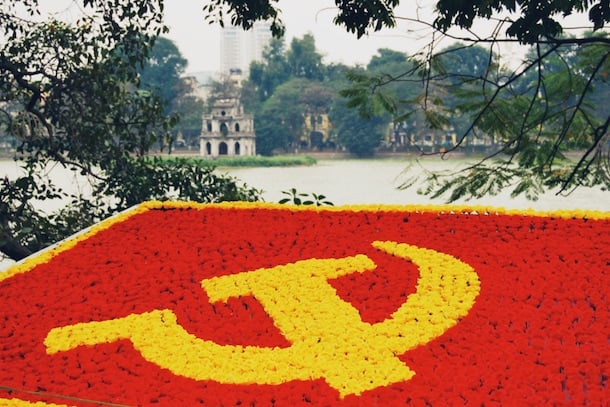My personal experience with Jesuits has been overwhelmingly positive.
I was reminded of that this past Sunday, as I attended Mass at my high school alma mater. I enjoyed my four years as a student there, and the friendships I made and the lessons I learned have continued to bless me, year in, year out.
I have written several times about the theology teacher who I believe will one day be recognized by the universal Church. Sunday’s Mass was no different, as I was edified and amused by the Jesuit homilist, was inspired by the young priests present who graduated after me, and enjoyed seeing both former teachers and classmates.
But there was something different.
One of the lessons that was reinforced for me at my alma mater was that Communism was a great evil. This lesson was taught by classmates whose families had fled that evil in such places as Vietnam, Lithuania, and Hungary. It was also taught by friends and classmates whose families barely escaped Tito’s butchers by fleeing from Slovenia to Austria and eventually the United States. Thousands of other Slovenian Catholics weren’t so lucky. We don’t know exactly how many, because the post-Communist government of Slovenia decided to stop uncovering the many mass graves Tito left behind. I was thinking of all this because America, the magazine published by America’s Jesuits, recently featured an essay making “The Catholic Case for Communism.”
This essay never acknowledges the scale of Communism’s persecution of Christians in general, nor Catholics in particular, a persecution begun under the first Communist regime to seize power and repeated today, in varying degrees, wherever Communists still cling to power. Nor does this essay mention the many millions killed by Communists, of whom the Slovenian Catholics are but a small drop in a vast crimson ocean. Historians estimate that the death toll from just one of Communism’s many bloodbaths, Mao’s disastrous Great Leap Forward, was 45,000,000.
Needless to say, the author also does not cite any nation where Communism succeeded as an economic and political system for the simple reason that no such nation exists. Instead, the contrasting records of West Germany and East Germany, South Korea and North Korea, and Mao’s China, Taiwan, and Hong Kong, among others, offer powerful proof that Communism causes people subjected to it to be dramatically less wealthy and less free than their ethnic and cultural kin who live in non-Communist polities. Rather than confronting the historical and economic facts, the author bleats about how well-meaning he and his fellow Communists are, about how well-meaning some other leftists have found Communists to be, and about how evil capitalism is, without ever bothering to explain why he chooses to live in non-Communist Canada when he is free to live in Pyongyang or Havana or Caracas instead.
The essay’s defenders are similar. Rick Malloy, S. J., suggests, “Just because some communist countries have grossly violated the canons of communism (e.g. gulags, etc.) does not prove communism as a theory is wrong.” Fr. Malloy does not cite a single Communist country that did not feature political oppression, nor explain how Lenin and Stalin and Mao deviated from the system they devoted their lives to, nor demonstrate that killing opponents of Communism is in any way inconsistent with Marx’s advocacy of class conflict, revolution, and the “dictatorship of the proletariat.” Neither does Fr. Malloy come to grips with the many dissidents who experienced the gulag firsthand and saw it as the logical culmination of Marxism, nor its perversion. One suspects that there is more wisdom to be found in ten minutes of Solzhenitsyn than in decades of Rick Malloy, S. J.
Matt Malone, S. J., the editor of America, defended his decision to publish an essay extolling the political philosophy whose adherents killed, imprisoned, and tortured thousands of Catholic priests and religious simply because they were Catholics, saying, “This is a journal of Catholic opinion, and Catholics have differing opinions about many things. Our job is to host a conversation among Catholics and our friends in which people can respectfully and intelligently disagree.”
Really? There are many opinions held by millions of Catholics that America apparently wants to exclude from the conversation. It has not, so far as I know, asked anyone to make the case, for example, for the immigration policies of the current presidential administration, or Matteo Salvini, or Viktor Orban, even though those policies are supported by millions of Catholics. Judging by what it prints, America believes that Communism should be part of the conversation, but that populism and nationalism should not be, even though populists and nationalists are not murdering or imprisoning their political opponents and even though populists and nationalists preside over successful countries that people are trying to enter, not flee.
If Fr. Malone wants to show that America truly is hosting “a conversation among Catholics and our friends in which people can respectfully and intelligently disagree,” he will be as willing to publish essays defending Donald Trump as he is willing to publish essays extolling Karl Marx. But if the magazine continues to treat Trump supporters worse than it treats Communists, it will make clear that its principal aim is the promotion of a one-sided political viewpoint, something critics have long contended but that I was reluctant to believe until now.



Leave a Reply